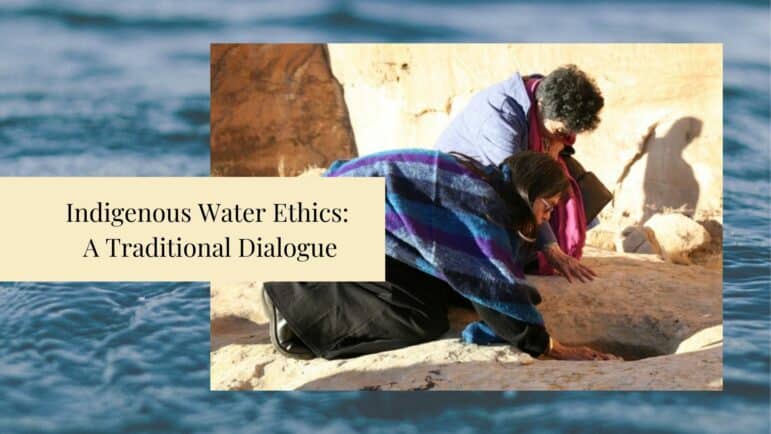
Indigenous Leaders to Discuss Water Ethics on October 7
Indigenous Water Ethics: A Traditional Dialogue
Thursday, October 7, 2021
9 a.m. Los Angeles | 12 p.m. New York | 6 p.m. Paris
REGISTER TODAY
Water is fundamental to all life on Earth. Protecting water is essential for ecosystem restoration, biodiversity, food justice and calming the climate crisis. As we seek to build frameworks for regenerative systems, Indigenous peoples—who already safeguard water and hold ancestral knowledge and cultural practices necessary to support that work—deserve a place at the center.
Join the Center for Earth Ethics on Thursday, October 7, at noon Eastern Time, for a webinar, “Indigenous Water Ethics: A Traditional Dialogue.” Mona Polacca, senior fellow for CEE’s Original Caretakers Program, has assembled representatives of different Indigenous cultures to present their diverse perspectives and lived experiences stabilizing, protecting and creating resiliency for their communities’ water sources.
Speakers scheduled to appear in the dialogue are:
Rāwiri Tinirau, co-director of Te Atawhai o Te Ao, a Māori research institute focused on health and environmental research. He is also deputy chair of Ngā Tāngata Tiaki o Whanganui, the post settlement governance entity for the Whanganui River settlement—the landmark 2017 case granting “personhood” to New Zealand’s Whanganui River.
Betty Lyons, president and executive director of the American Indian Law Alliance (AILA), an Indigenous and environmental activist, and citizen of the Onondaga Nation. She has worked for the Onondaga Nation for more than 20 years and is a fierce protector of Onondaga Lake and the Creek that connect the Nation to the body of water. Betty is co-chair of CEE’s Advisory Board.
Austin Nunez, chairman of the Wa:k—San Xavier District of the Tohono O’odham Nation located in the arid Sonoran Desert region of southwestern Arizona. He will present a case study about a 23-year legal challenge to regain his tribe’s inherent well and water rights.
CEE’s Original Caretakers Program promotes learning from Indigenous knowledge to address the ecological crisis. The program also supports wisdom keepers from Indigenous traditions, advocates for Indigenous rights and self-determination, and seeks the engagement of Indigenous peoples in economic development decisions.
